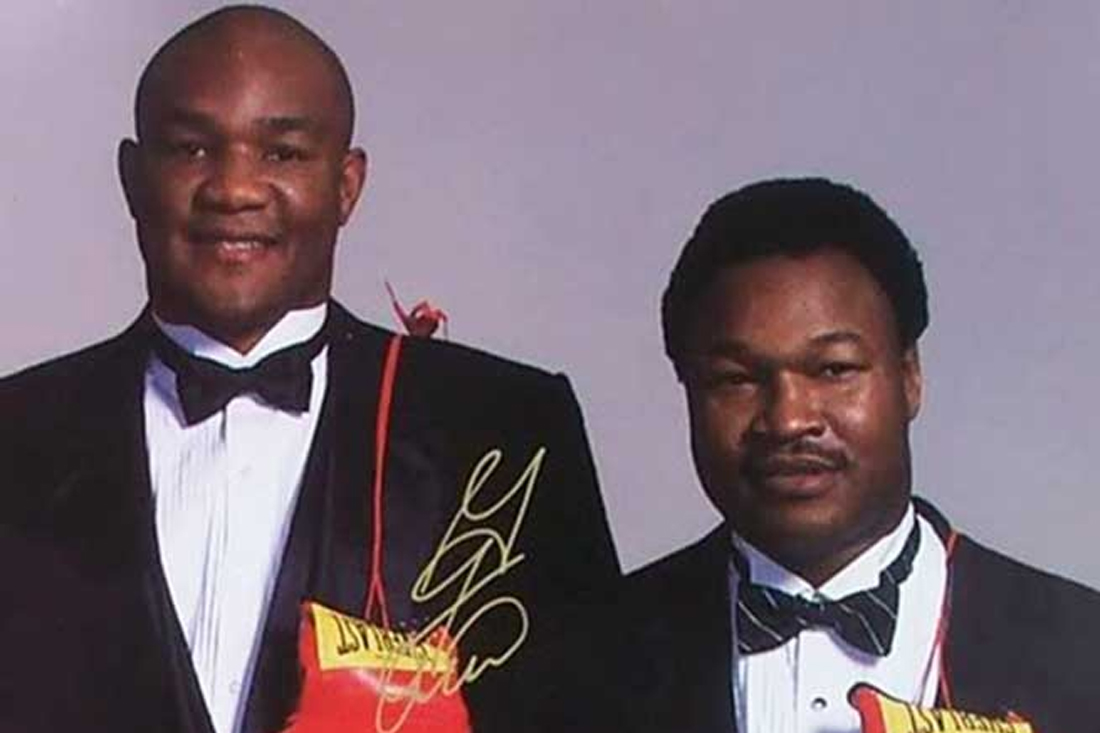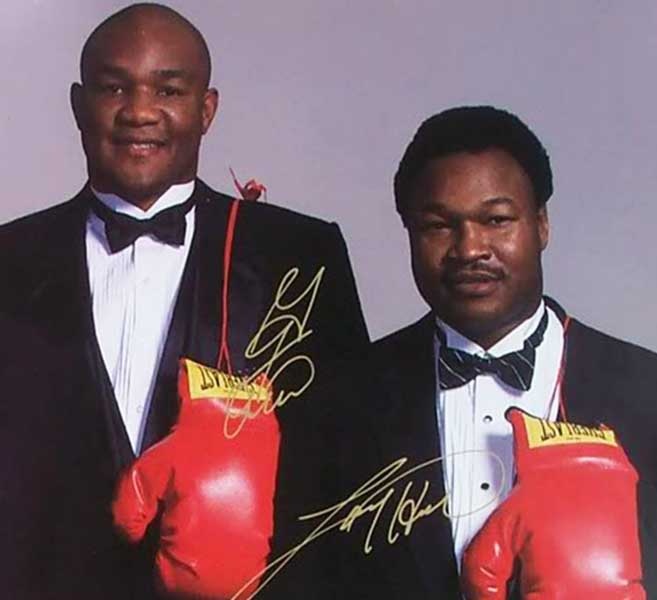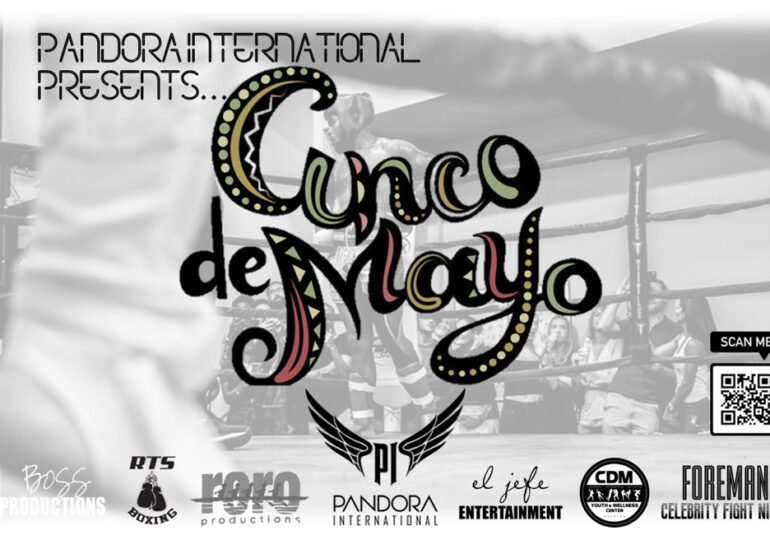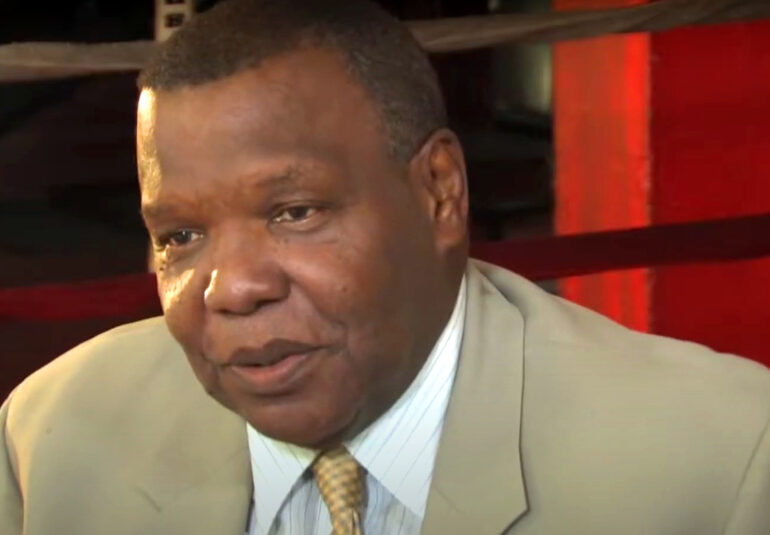
By Bernard Fernandez on January 22, 2015
The Sweet Science
On Jan. 15, 1990, heavyweights George Foreman and Gerry Cooney squared off in Atlantic City’s Boardwalk Hall. Some clever punster had dubbed it “the Geezers as Caesars,” a backhanded swipe at an event which, to some people’s way of thinking, paired a couple of over-the-hill, used-up fighters who should have been content to sit on their rocking chairs and sip their Geritol.
Cooney was 33 at the time and was fighting for just the third time in six years; Foreman, was 41, having celebrated his birthday just five days earlier.
Geezers? In retrospect, it now seems obvious that Cooney and that reasonably fresh version of Big George, who won on a second-round stoppage, were just a couple of kids going at it in the schoolyard.

Last week, the boxing world celebrated the 50th birthday of an actual geezer, Bernard Hopkins, who took the occasion to tell everyone he believed he had one more fight in him, and that it would come against a younger (of course), highly credible opponent. But even “The Alien” against anyone might not seem so age-defying when stacked against a matchup of Jurassic Park heavyweights that had been scheduled to take place on Jan. 23, 1999, in Houston’s Astrodome.
Had that pay-per-view bout (suggested purchase price: $39.95) gone off as scheduled, the combatants would have been a 50-year-old Foreman (then 76-5, 58 KOs) and 49-year-old Larry Holmes (66-6, 42 KOs). Oh, sure, smarmy critics would have sneered at it and someone surely would have come up with a derogatory phrase, maybe “Old Folks Home at the Dome.” But here’s the truth: Hundreds of thousands of fight fans would have bought it, maybe because it would have finally pitted two of the better big men in boxing history, even if they were grandfathers, or maybe because it came with an element of morbid curiosity.
“There was interest, a whole lot of interest,” Foreman said when I asked about his recollections of a bout that would have been a real-life enactment of “Grudge Match,” a bad 2013 movie whose premise was a 30-years-in-the-making rematch between sixty-something antagonists played by Sylvester Stallone and Robert DeNiro. But the notion of a “Rocky Balboa” and “Raging Bull” somehow getting together to make box-office magic fizzled.
Might the same thing have happened with Foreman-Holmes?
“Larry and I were really in the mood to do it,” Foreman recalled. “When we met at the press conference in New York, we started selling woof tickets, the whole deal. And it would have sold; I’m sure of that. There was so much name recognition there. That’s what made it more important on the latter end.
“I left boxing in 1977 (the start of Foreman’s 10-year retirement from the ring). At that time, it wouldn’t have meant much for me to box Larry Holmes; he was just making a name for himself at that point. Then, by me going off the scene, Don King went all-in on promoting Larry. When I made my comeback, can you believe that Larry was retired then? So the timing never was quite right for us to fight, for one reason or another.”
For his part, Holmes was just as anxious to throw down with Foreman, and not just because, had the bout come off, Big George would have been paid $10 million and Holmes $4 million.
“When it didn’t happen, I was very disappointed,” the “Easton Assassin” said. “That was my dream, man, to fight George Foreman. I got tired of people saying, `What about George Foreman? Why don’t you fight George Foreman?’ All I could say was, `It ain’t me that won’t fight George, it’s George that won’t fight me. I’m ready when he’s ready.’ But he was never ready.
“But you know what? Looking back at it now, I don’t blame him. I wouldn’t have fought me either. I could still fight then, man, and George did not want to lose. But winning or losing didn’t matter as much to me. I wasn’t fighting for a championship. I was fighting to pay the rent, and I would give my all to do that.”
Debate if you must the possible outcome of the fight-that-never-was – and Teddy Atlas and esteemed journalist Jerry Izenberg will do just that, a little later in this piece – but know this: Foreman-Holmes wasn’t just a fantasy. The legendary figures had collected a non-refundable 10 percent of their contracted purses ($1 million to George, $400,000 to Larry), the Astrodome was booked and a press conference held. All that remained was for the promoter, an Englishman named Roger Levitt, to produce letters of credit that would have ensured that the fighters receive their full purses.
“On the date that letters of credit were supposed to be posted, the guy missed it,” Foreman, who pulled the plug on the fight, said in early January 1999. “My instincts were to say, `That’s it.’ My attorneys were a little lenient with him. They gave him a week’s extension. He just couldn’t come up with a letter of credit. A fight just couldn’t be made without a letter of credit.”
Sixteen years later, Foreman stands by that statement. He was a fighter, to be sure, and a proud one, but he also is a businessman and he wasn’t about to give himself away at a discounted rate.
“I think (Levitt) thought that since he put that first million dollars up, I would blindly follow him along,” Foreman said. “But I’d dealt with Don King and all those guys. I knew you must have the money in the bank to proceed. I wasn’t going down that trail, not knowing where it would lead, as some guys have done.
“It probably was one of those situations that was just not mean to be. Larry and I kept missing each other.”
At the time, Levitt insisted he had arranged for a $9 million insurance bond, which he said was “almost as good” as a letter of credit. But additional financing dried up when a younger heavyweight, and a superstar one at that, scheduled a pay-per-view fight just one week before Foreman-Holmes was to take place. If a financial knockout blow was dealt to George and Larry, it came in the form of the Jan. 16, 1999, PPV scrap between Mike Tyson and Frans Botha at the MGM Grand in Las Vegas. Tyson, as expected, battered Botha into submission in five rounds.
It was Levitt’s contention that a key financial backer for Foreman-Holmes got cold feet in fear of going against Tyson for fans’ PPV dollars.
“We had an Arab businessman who I’ve known for some time, who was putting up $12.6 million,” Levitt said at the time of the cancellation. “He pulled out because of the timing of the Tyson fight. His advisers told him we were going to get killed on the pay-per-view.” Tyson-Botha, by the way, came with a PPV tariff of $49.95.
Interestingly, it wasn’t the first time that Tyson torpedoed a possible Foreman-Holmes scrap.
“When I fought Evander Holyfield in Atlantic City (Holyfield defended his WBC, WBA and IBF titles on a unanimous decision on April 19, 1991), we did real well,” Foreman recalled. “Holmes had come back and (promoter Bob) Arum had a lot to do with Larry’s fight with Holyfield (which Holyfield also won, on a unanimous decision, on June 19, 1992). Arum was thinking about doing something with Larry and me, and he even printed up a poster that had us fighting for the heavyweight championship. He wanted to promote that fight if Larry beat Holyfield. But Larry didn’t win.”
Perhaps Foreman is right. Can there really be something to astrology? Could it be that the stars never properly aligned themselves to make Foreman-Holmes doable?
Atlas and Izenberg each is of the opinion that had they fought in the late 1970s, boxing master Holmes, with that laser-accurate jab, ability to pace himself and superior boxing skills, might have been too savvy for the young George, whose stock in trade then was to throw as many loaded-up haymakers as he could, and as quickly as he could, until he flattened his opponent or ran out of gas.
But the 1999 version of George vs. the 1999 version of Larry? That likely would have been another matter. That George fought more under control and had – gasp! – learned some of the finer points of boxing. Atlas and Izenberg each see him as being too much for Holmes to have handled.
“The old George Foreman, the reincarnated George Foreman that came back after a 10-year hiatus, was tougher than the young George Foreman,” Atlas offered. “He was smarter. In a lot of ways, he was just better. He wasn’t better physically, having gotten older and fatter, but he was better in the most important areas. He understood the difference between truth and lies.
“He bought into a lie in Zaire (against Muhammad Ali). He was a bigger, stronger guy than Ali, but Ali made him feel that that didn’t matter. George couldn’t make the decisions he needed to make. He couldn’t endure what he needed to endure. He wasn’t tough enough to handle the things that Ali represented that night. But of course he could have; thinking he couldn’t was the lie he bought into. He didn’t have to cave in.
“George had to live with that for 10 years, and living with it was a helluva lot harder than the punches he would have had to take for a few more rounds. So when he came back, he came back tougher. I think the older George Foreman would have beat the crap out of the younger George Foreman, and I think the older George would have beat the older Larry. But I would have taken the young Larry over the young George. That George didn’t have as many dimensions as Larry. When his power didn’t work, like it didn’t work in Zaire, he didn’t have anything else to back it up with.”
Izenberg pretty much sees it the same way as Atlas.
“The Foreman who fought Ali in Zaire would not have beaten Larry, I don’t think,” said Izenberg, the columnist emeritus for the Newark Star-Ledger. “George became a far, far better fighter, a far, far smarter fighter, in the second phase of his career.
“When Big George first came back, I laughed. We all did. But the more he fought, the more he got into a groove. I think he proved to everyone how much he had learned as a fighter when he was doing television (commentary).”
Which is not to say Izenberg is convinced Foreman-Holmes would have been PPV gold in 1999.
“Forget about Tyson (fighting Botha the week before),” he said. “Who would have put up 40 bucks to see those guys fight at that stage, 15 years past their prime? I personally believe that it should not have been allowed to take place.”
Holmes, of course, sees himself as the winner over the young George and the old George.
“The way I would have fought George (in the late 1970s) is the way I would have fought him in 1999, or now,” Holmes said. “I’d move side-to-side, use the jab, sneak in the right hand, put some combinations together, get in there a little bit and box him inside. Just tire him out. That’s it.
“George was good for four or five rounds. If you hurt George, he’d fight you harder. But when he did that, he’d either take you out or empty his gas tank. He didn’t have good stamina. Take him into the sixth and seventh rounds or later and he couldn’t go.”
You’d think Foreman would offer a stern rebuttal, but it isn’t necessarily so. He thinks some of the points Holmes makes are valid.
“I was smarter the second time around,” he agreed. “I learned how to pace myself. I’d wait around for a few rounds, then try for a seventh- or eighth-round knockout. I didn’t want to burn myself out like I did in the early part of my career. But that would have played into Larry’s box of tricks because he was a guy who always knew how to pace himself.
“If I was a betting man, I’d give the edge to Larry in a 12-round fight. I’m just being honest. Larry always made sure he had something left in the tank in the 10th, 11th and 12th rounds. But if a fight between me and him ended early, I’d have to go with myself.”
Foreman said he understands why Holmes always seems to carry a chip on his shoulder, and why he wanted a fight with him so badly.
“Larry became heavyweight champion after Muhammad Ali, and he might have thought, `Now I’ll be as big as Ali.’ But what’s that old saying? Beating The Man or succeeding The Man doesn’t make you The Man. Nobody could supplant Ali in terms of recognition. Realizing that probably kept Larry angry for a while. A lot of us went through that, but I think Larry struggled with that more than anyone.”
So what do you think TSS Nation? Who would you go with, young Larry vs. young George, and old Larry vs. Old George?



